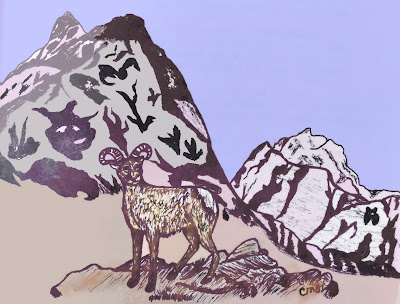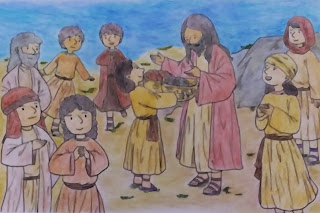The 6th of January comes the day AFTER the 12th Day of Christmas. This is celebrated by western Christians who use a structured calendar as the coming of the Magi or Wise Men. There is recognition that Jesus may have been up to 2 years old when the Wise Men came, since evil King Herod sought to kill all the baby boys in Bethlehem up to that age. Also, the account refers to Jesus as a "child" (though that culture, like ours, sometimes called babies "children"), and the family was in a "house."
This day on the church calendar is called "Epiphany", which means a "shining forth." Obviously, that refers in one sense to the star which shone forth. It also refers to Christ's divinity, His "God-ness", shining forth. These mysterious visitors from the east took the message of this new King far outside the region of Bethlehem. Epiphany is a whole season where the Bible readings in church refer to ways His divinity shone forth, though He often kept it to Himself.
Who were these mysterious visitors from the East? The term "Magi" may give us some clues as to who these men were. "Magi" is a close rendering of the Greek term for the Wise Men in Matthew chapter 2. In Greek, the singular is "magos", and the plural is "magoi." The word derives from the Old Persian word "magus."
According to some sources, the term entered the English language via Latin around AD 1200. In English usage, the term seems have shown up in literature prior to being used in an English translation. Some relatively modern literature includes T.S. Elliot's poem "The Journey of the Magi" and O. Henry's short story "The Gifts of the Magi" [which is not about the Wise Men at all]. There are links to both below. The rare English usage in a Biblical translation is the New International Version, but only to describe the Wise Men in Matthew Chapter 2, not in other usages where "magos" appears in original Biblical languages.
The term magus first emerged as a tribe of the Median people. The Medes were close relatives of the Persians and banded with them to form the empire which conquered Babylon and continued overlordship of the Jews for about two-hundred years (539-334 BC). The Magi conducted sacrificial duties and delved into the occult, that is, "otherworldly" supposed special knowledge that falls outside whatever the practitioner's mainstream religion is. Magi came to generally be seen as keepers of all kinds of special knowledge. This includes astronomy/astrology and the medicine of the day.
The early Median Magi were pictured as tall, wearing flowing robes and tall, conical hats. (As Nativity sets were developed in medieval Europe, the Wise Men were still pictured as tall and thin, adding to their sense of mystery.) They wore white robes.
The Greek historian Herodotus wrote that the term was used, generally, by the aristocrats of the Median people. If so, it seems the usage had expanded some. These were considered men who could interpret dreams. Internal strife between the Medes and the Persian emperors led to the Magi's status being reduced.
At one time in its usage, it specifically referred to Zoroastrian priests. (Zoroatsrianism is a Persian religion that has somewhat mysterious origins and is named for its founder, Zoroaster. When, exactly, it began is unclear, but it was on the horizon during the Jews' exile in Babylon, which was conquered by Persia.) By New Testament times, the mystery religion Mithraism had arisen in Rome. Though dedicated to the Greco-Roman god Mithras, the god's original name and many of the practices were derived from Zoroastrianism. It appears that occultic priest-astronomers connected with this religion were called "Magi."
In Greek, the word began to morph into the concept of "magician", as we know it. This usage entered Latin, also. Early Church Fathers, including Justin, Origen, Augustine and Jerome translated "magos" as "magician", not distinguishing the Wise Men from others referred to by this term. The same term is used for Simon the Magician and Elymas the Sorcerer in Acts chapters 8 and 13.
Jeremiah chapter 39 refers to Nergal-Sharezar as the "rab mag" ("chief magus"), blending Hebrew with an alliteration of Persian. Some believe that Daniel held a similar title. However, Daniel seems hesitant to have written of himself using this term, either to keep from offending those magi who were Median or to emphasize his Jewishness and identity as a worshipper of Yahweh. In any case, those jealous of Daniel were referred to as satraps, not as magi.
Matthew chapter 2 discusses the Magi studying the stars. This led early English translator John Wycliffe to translate the word as "astrologers." At that time, there was no distinction between the concepts of "astrologer" and "astronomer." Up through the Protestant Reformation, Christians considered that God might be speaking to them through astronomical events and did not necessarily consider "astrology" to be witchcraft nor the occult.
Legends grew about the Wise Men. They were often referred to as "The Three Kings" and assigned names and ages. They were most certainly not kings. And we don't know how many there were: only that there were three gifts. There were at least two because the plural term is used. At the height of trying to make the Wise Men represent all people, they were said in some legends to be exactly 60, 40 and 20 years old, with one being Caucasian, one Black, and one Asian. They were given various names, also. The most common names circulating in European traditions, were Caspar (or "Gaspar" from the Persian "Jasper", a precious stone), Melchior, and Balthazar, who is most commonly considered the Ethiopian, or Black, Wise Man. Ethiopian Christians named them Karsudan, Hor, and Basanater. Syrian Christians named them Larvandad, Homisdas, and Gushnasaph. Speculation began that each of the three gifts was highly symbolic. This symbolism is spelled out in the carol "We Three Kings of Orient Are" (also linked below). Gold is said to honor a king. Incense (or frankincense) is said to be honoring the Baby Jesus' divinity, since incense is used in Temple worship (not just in the ancient Jewish faith and some forms of Christianity, but in all kinds of religions). Myrrh was an ancient spice often used in the burial of bodies; therefore, this was said to note the eventual sufferings and death of the Christ. While Jesus was offered wine mixed with myrrh at His crucifixion and buried with a mixture that included myrrh, this expensive item was also used among the living. Myrrh was used in perfumes, anointing oils and medicines. At any rate, some of these costly items may have been sold or exchanged to pay for the journey into Egypt, made necessary by mad King Herod's wish to destroy Jesus, and the subsequent resettling in Nazareth. Jesus, as an adult, certainly identified Himself as having no real worldly possessions.
The Bible does not mention the camels often pictured in nativity scenes. This idea likely comes from the Old Testament prophecy from Isaiah 60, thought to refer to the Wise Men. The presence of camels make sense, though, with them being common pack and travel animals in the Middle East of Jesus's day.
The Wise Men don't always seem so "wise." Why did they blunder right into Herod's domain, asking openly about the new King of the Jews? Herod the Great was a massively jealous, psychopathic man (something known to history.)
After visiting the Holy Family, the Magi disappear from legitimate history. Old legends spun stories that Thomas, who was the apostle to India, met up with the Wise Men on his travels East. [The idea that Thomas was an apostle to India may not be fictitious of itself, though; there are also very old stories in India that he established the first Christian churches there, those in existence long before the British colonized.) Lew Wallace wove their story into Ben-Hur. Another fictional story invents a fourth Wise Man. It's quite possible, though, that they had passed away before Jesus started His earthly ministry.


.png)
.jpg)


.jpg)

.jpg)









.jpg)
.jpg)




.jpg)
.jpg)



.jpg)




